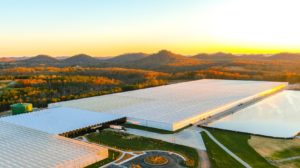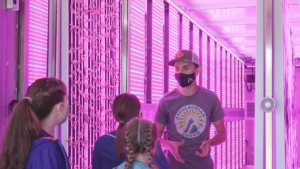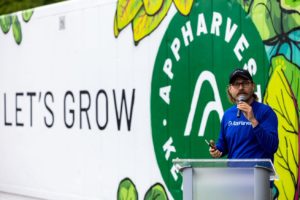Farm of the Future: Q&A With AppHarvest CEO Jonathan Webb
Indoor Ag-Con is pleased to announce that AppHarvest CEO & Founder Jonathan Webb is joining our CEO Keynote line-up for the February 28-March 1, 2022 edition at Caesars Forum, Las Vegas. His presentation, “How Tech In Farming Can Build A Resilient Food System,” will be on Monday, February 28, from 11 — 11:50 am.
From building an AgTech hub in Central Appalachia to launching the “Fight the Food Fight” campaign to investing in and supporting high school AgTech education, learn more about how Jonathan and the AppHarvest team are working to solve today’s food and agriculture challenges in this month’s CEO Q&A.
It’s your home state, what are the conditions– efficiencies of scale, workforce, available water and other benefits that make Kentucky and Appalachia an ideal location for AppHarvest?
 Kentucky is my home state and I do love it. But, it also makes sense strategically to build an AgTech hub in Central Appalachia for a few reasons:
Kentucky is my home state and I do love it. But, it also makes sense strategically to build an AgTech hub in Central Appalachia for a few reasons:
- Kentucky’s climate is well-suited for the industry. We grow using 100% rainwater and climate change is making the region wetter. In fact, the past decade has seen the most rainfall in Kentucky history with three of those years being the wettest on record. If you’re growing products that are up to 95% water like fruits and vegetables, you need to be where water is available.
- The strategic location of our flagship farm in Morehead, Ky., allows AppHarvest to provide sustainable produce to up to 70% of the United States population within a day’s drive.This approach gets food closer to where it’s consumed, shortens transportation time significantly and reduces diesel use by as much as 80%.
- Labor is another reason. With industries such as coal and tobacco going away, the region needs more jobs for a skilled workforce, and we are able to tap into that labor pool for our high-tech farms.
What historic milestones are comparable to what AppHarvest is attempting with the Farm of the Future? Automotive assembly line? 1960s space race? Why?
At AppHarvest, we believe that controlled environment agriculture (CEA) is the third wave of sustainable infrastructure. In my experience working on major solar projects with the U.S. Department of Defense, the first wave was 20 years ago with renewable energy. The second wave came 10 years later when Tesla made electric vehicles popular in the mainstream. Now, we’re in the third wave and it’s CEA using a combination of nature supported by technology to produce a lot more food with fewer resources. We’re using artificial intelligence and robotics to make data-driven decisions to farm more efficiently and better predict crop yield.
What was the rationale behind the “Fight the Food Fight” campaign and how are sales going with your “Food Fight“ salsa?
 Change begins with education. We recognized the need for a consumer movement to encourage folks to learn where their food comes from and understand that their purchases matter. The Fight the Food Fight campaign is a call to action that asks consumers to join us in creating a more resilient food system designed for the long-term wellbeing of people and planet by supporting products that promote sustainable farm operations and good, living-wage jobs in agriculture.
Change begins with education. We recognized the need for a consumer movement to encourage folks to learn where their food comes from and understand that their purchases matter. The Fight the Food Fight campaign is a call to action that asks consumers to join us in creating a more resilient food system designed for the long-term wellbeing of people and planet by supporting products that promote sustainable farm operations and good, living-wage jobs in agriculture.
In early November 2021, we introduced our first product tied to the campaign, called the Food Fight Salsa. The main ingredient is AppHarvest tomatoes and all other ingredients are U.S.-grown. The salsa sold out within a few weeks and is back in stock on our direct-to-consumer website at shop.appharvest.com. We ask you to Fight the Food Fight with us!
Can you share a little about what AppHarvest is doing on the AgTech education front to help train the next generation of farmers, specifically with regard to your collaboration with Eastern Kentucky High Schools.
 As we work to build a hub of sustainable agriculture in Central Appalachia, we know we need to create an AgTech ecosystem with good education at all levels. That’s why we are investing in the next generation of farmers and futurists by supporting high school AgTech education. We have launched seven container farms since the start of our program, with a goal to have 20 across Central Appalachia to serve as a model across the U.S.
As we work to build a hub of sustainable agriculture in Central Appalachia, we know we need to create an AgTech ecosystem with good education at all levels. That’s why we are investing in the next generation of farmers and futurists by supporting high school AgTech education. We have launched seven container farms since the start of our program, with a goal to have 20 across Central Appalachia to serve as a model across the U.S.
 These free-standing training facilities are made from shipping containers retrofitted with the latest sustainable agriculture technology, including energy-efficient LED grow lights and a closed-loop irrigation system that teaches students how to use up to 90% less water and grow up to 30 times more food in the same amount of space compared to traditional open-field agriculture. One container farm classroom can produce the equivalent of three to five acres of traditional agriculture, and the technology in each unit is a good example of what AppHarvest employees use every day on a larger scale.
These free-standing training facilities are made from shipping containers retrofitted with the latest sustainable agriculture technology, including energy-efficient LED grow lights and a closed-loop irrigation system that teaches students how to use up to 90% less water and grow up to 30 times more food in the same amount of space compared to traditional open-field agriculture. One container farm classroom can produce the equivalent of three to five acres of traditional agriculture, and the technology in each unit is a good example of what AppHarvest employees use every day on a larger scale.
Where do you see AppHarvest 5 or 10 years from now – what’s your ultimate goal?
The world’s food and agriculture problems are not going to be solved in the short-term. The AppHarvest team sees our journey to create a resilient food system taking decades. We’re at the beginning and working hard to create shareholder value now that will still be there in decades two and three. We want to help build a sustainable organization that will be able to go toe-to-toe with the larger incumbents globally.
One way we’re doing this is by growing to scale. In addition to our 60-acre high-tech farm in Morehead, which can produce an estimated 40 million pounds of tomatoes per year, we are expanding our farm network to include three more farms expected to be operational by the end of 2022. The 15-acre Berea, Ky., leafy green facility and the 60-acre Richmond, Ky., tomato facility are both approximately 60% complete, and the 30-acre Somerset, Ky., berry facility is more than 40% complete. A fifth farm, the 10-acre Morehead North leafy green facility has an expected 2023 delivery. The company is working toward a longer-term goal of up to 12 farms by 2025.
AppHarvest isn’t going to save agriculture on its own. We know that a number of large companies will be working to solve our food and agriculture problems, and we intend to be one of them.
Learn more about AppHarvest by visiting their website — www.appharvest.com — and register today to join us for the Indoor Ag-Con to hear Jonathan’s keynote address!
